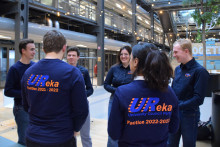Hooray! The University Council student delegation got some external criticism. Let’s see if we can explain ourselves, make participation thrive, and get to the 31% turnout again. With the criticism, we are (of course) referring to Niels ter Meer’s recent column about the BSA.
We have to admit that the UReka faction got a little sad when we saw the column initially. It wouldn’t be the first time we saw fruitful discussions turning into polarising debates with the likely consequence that faith in the Central Participation lowers to new depths. But instead of riding along on the polarisation train, let’s see if we can steer back onto a more constructive track.
Ter Meer’s opening story about a tutor meeting in which thought was mainly given to a student’s ability to participate in a project, instead of their wellbeing worries us, just like it does Ter Meer. Educational institutes should think more in terms of student success instead of study success, and these are two inherently different ways of thinking. In the national debate, we often refer to student success as the 'perspective that each student requires something different to become successful in their personal, academic, and professional development' (for reference, see Strategic Agenda Higher Education, 2019) and to study success as 'getting students to graduate efficiently' (for reference, see ISO, LSVb & LKvV, 2014), although this discussion is far more nuanced and there are different interpretations of the terms (NRO, 2022). Either way, Ter Meer’s story exemplifies that there is too large a focus on study success, and this needs changing.
The question then is 'How?' And here is where the UReka faction misses the nuance in Ter Meer’s column. Because we are not oblivious to the downsides of the BSA. We wrote in our letter to the Ministry that the dropout rates concern us, just like the stress associated with the BSA. Niels, we agree with you! Student wellbeing and personal circumstances (read: acknowledged reasons to get an extended BSA and/or financial support) are key points of interest to the students in the University Council.
Hence, we talked to the Executive Board, the Committee Personal Circumstances (CPO), and study associations about the stress that students experience as a result of the BSA and requested the CPO to advise about deferred BSA’s earlier in the year. Similarly, we advised the Executive Board to provide students with clearer information about BSA deferrals so students already know early in the year that valid personal circumstances will grant you a BSA deferral. Not to mention that all the examples Ter Meer mentions could well be considered valid personal circumstances. More than anything, this shows communication about the BSA and studying with personal circumstances needs to be improved.
We embrace the Education Inspection’s conclusion from 2010; a BSA cannot stand without personal guidance, and we act accordingly. The Council students take seats in a workgroup about the wellbeing website so that we can directly hear about issues and contribute to solutions surrounding information provision, and we join meetings with study associations to see what can be done to improve student wellbeing. We devote attention to students from crisis countries and the long waiting lists for student psychologists back in 2022.
We agree this system is flawed and that personal circumstances should not be the exception to the rule, but an accepted dimension of one’s (student) life. But to say we, and the current BSA regulations, ignore outside influences and personal circumstances altogether is too shortsighted.
We simply believe that the way to move forward is not by postponing the BSA to the second year or by having a nationally determined point standard (of 40 ECTS, for example). Yet, these options seem most realistic. The students in the University Council believe that this would be diverting the problem instead of solving it.
What we do want is to establish a clearer and more effective framework for helping students to get to the right study – the original intention of the BSA. Realising more and more effective personal guidance for students, just like ter Meer rightfully pleads for and that we need more (financial) resources to realise this ambition. Organising an alternative for the BSA that will actually help students instead of stressing them out. But that requires a critical look at what the BSA brings us and what it costs us.
Our letter to the Minister was a call to consider these points, engage in a conversation about them, and work on an integral approach to solve the underlying problems of the BSA, instead of merely reconsidering the BSA in isolation. And so we have. We had a productive conversation with the Ministry about ways to move away from a harsh BSA towards a system that looks at student success and which steps are needed to achieve that sustainably. Because that is what we think is needed for students to feel free and enjoy the ride.








